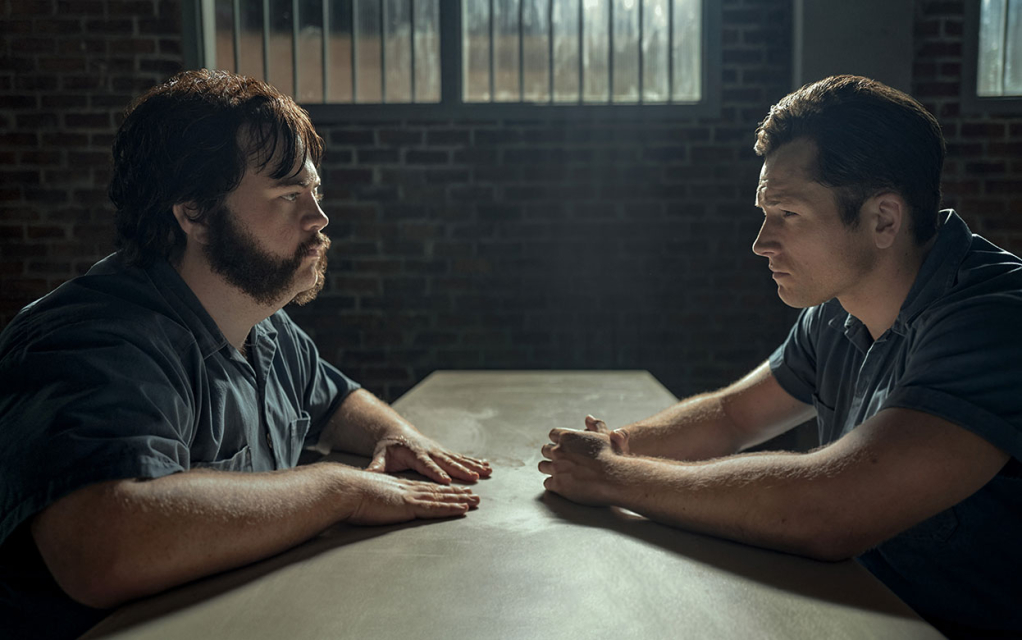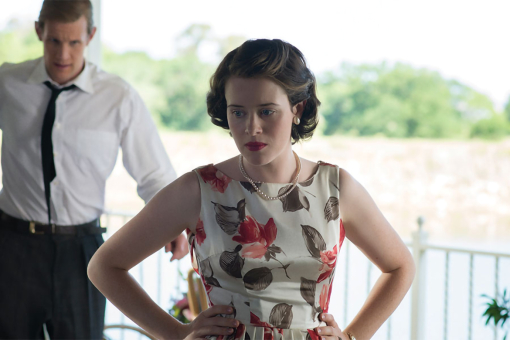Taron Egerton and Paul Walter Hauser might seem like strange bedfellows. But Egerton — a dashing Welshman known for his work in the Kingsman films and as Elton John in the biopic Rocketman — and Hauser, a burly Midwesterner acclaimed for such films as I, Tonya and Richard Jewell, had a singular experience making the Apple TV+ limited series Black Bird.
The six-episode series inspired by a true story follows Jimmy Keene (Egerton), a former high-school football star who is convicted on drug and weapons charges and sentenced to ten years in a minimum-security federal prison. When the government offers to commute his sentence in exchange for him moving to a maximum-security facility and eliciting a confession from accused serial killer Larry Hall (Hauser), Keene agrees to the plan. Dennis Lehane, a crime novelist who also works in film and television (Shutter Island, The Outsider), adapted the series from In with the Devil: A Fallen Hero, a Serial Killer, and a Dangerous Bargain for Redemption, the 2010 memoir that Keene wrote with journalist Hillel Levin.
To discuss the series and their characters' arcs, emmy contributor Neil Turitz recently spoke with Egerton and Hauser, who bonded on-screen and off, yielding, they say, a unique and life-changing experience.
Let's start at the beginning. How did this project come to you?
Taron Egerton: When you're an actor, you get sent on these horrendous general meetings where you're sort of put in a room and there's not really anything to talk about. I happen to have had two good ones in my life. One of them was with Bradley Thomas, who's an executive producer on this show. I think he was integral in bringing me to Dennis Lehane's attention. And Dennis had really, really loved the Elton John film. What led him to think that I would be good for this part, I don't know, but that's how I got involved.
Paul Walter Hauser: Actually, it was just one read with Dennis over Zoom, and I really went for it. I think he responded to the fact that I didn't pull any emotional punches.
Paul, this isn't the first time you've played a squirrelly killer type. Did any of those earlier performances inform this one?
PWH: As far as there being some sort of thread, I'm sure there is one unconsciously, absolutely. It's me doing another wounded animal of a man. But I tried to approach everything blank-slated as far as physicality, intention, voice — all that stuff.
Taron, did you see any connection between Jimmy and some of your earlier work? Also, is this your first time doing an American accent?
TE: It's not. It's the second time, but I'm not going to tell you what the other time was, because I'm sweeping it under the rug (both laugh). [Note: it was the 2018 film Billionaire Boys Club.] Well, in the same way that Paul has recognized his thread in the roles that he's played thus far, I think there's an accessibility to the characters that I've played, and a sort of softness that may be quite inherent to who I am, or a vulnerability, and that's in Jimmy, too.
Jimmy's vulnerability is very different from say, Elton John's.
TE: Right. But although there's a kind of old-school masculinity in Jimmy, he's still vulnerable. He's just got so much armor up. The physique, the way he carries himself, he sends this message to the world that he's impervious. Jimmy's hyper-, hyper-masculine, and that's quite at odds with who I am. I found that appealing, because the interesting thing about my part is that, through the course of the show, that's slowly dismantled through his interaction with Larry.
Can you give an example?
TE: You really see it happen the first time in episode four, where Larry asks him about his mother, and the predator in Larry sees some of that darkness in Jimmy for a second and he eats it out of him. It completely fries Jimmy's head because he's forced to confront his own darkness. From that point, it's a steady kind of coming apart of all these layers. That's what I loved about it, that arc — from this man of certainty to this man of absolute uncertainty.
Paul, Larry's arc is much harder to define. It's easy to dismiss him as a monster, but there are clearly more layers.
PWH: I want to make sure I give credit where credit's due. The episodes that Dennis wrote, I mean, there are those moments of humanity and levity. It's brilliant. As a groundwork for my choices, I was very lucky that that was paved. Much of what I'm doing there is akin to a pet or a child. Like when I take a bite out of a piece of bread and then stick my thumb through the middle and play with it, that's something a child would do. When I'm slinking around the walls and I'm almost flirtatiously leaning while talking to Jimmy, that's something a cat would do. If there's any empathy for him, I'm guessing a lot of that has to do with the feathery voice, the body language and those little bits of intentional or unintentional comedy.
You both talk about the physicality of it, and it seemed like there was a switch for you both. For instance, Taron, you're jacked.
TE: I've never been that big before. I'm nowhere near that big now.
PWH: I just have to speak up and say it's one thing to get there. It's another to maintain it for half a year.
TE: Thanks, mate. The real guy was in terrific shape, so there's that reality element of it. It was a very tangible way of staying as Jimmy. And of course, my actor's vanity plays into it as well. I'd be lying if I said it didn't.
Paul, by comparison, Larry seems softer and smaller than roles you've played.
PWH: When I did I, Tonya, I was probably 295 pounds. Richard Jewell, I was probably 290. I got down to about 245 for Larry Hall. It's not the kind of thing folks talk about, like, "Did you see the really obese guy get medium obese?" It's not like a sexy weight loss, but I saw a photograph of Larry Hall, and I thought, "I can look like him, but I should probably drop some weight to look more like him." Thank God I did, because now, when they put the photos next to each other, it basically looks like the same damn guy.
TE: Part of what makes the performance so utterly chilling is that he's so proficient in seeming innocuous. It's extraordinary, because until the sixth episode, at no point do you ever feel like he's on the offensive in a way that's kind of archetypically villainous. It's so much more layered and nuanced than that.
PWH: Thanks, man. I think if I'm leaning into the question, [I, Tonya's] Shawn Eckardt and Richard Jewell are sure of themselves. Larry is just out to lunch and doesn't even know he's holding a fork.
Your chemistry together is obvious, and it clearly translated to the screen.
PWH: Our relationship offscreen has a lot to do with the chemistry onscreen and the amount of trust and latitude we elicit from one another.
TE: We have a similar ethic about how we approach our work. It's the great magic of "the craft," to be pretentious. The onscreen relationship benefits from both of us wanting the same things. We want the cast and crew to feel seen and loved. We want to make sure we're doing the right thing, and we have a bit of fearlessness, in the sense of what we're dramatizing. We don't pull any punches.
These roles are both immersive. What mark have they left on you?
PWH: Personally, my takeaway was forcing myself to further dissect the depth to which men are responsible for horrific things.
My professional takeaway was what Taron said to me one night in a bar. He pulled me aside and said, "We own this space. This is our set. Apple's paying for it. Dennis is the genius behind its existence. But you and I, we run this set." It was really like a coach looking at a player going, "You're a very talented player, and you need to stop being so insecure. And you need to know that we're here to win a championship." For me, that was the first time in eleven, twelve years of doing this that, by the end of production, I felt like, "Oh, I'm meant to be here. I can trust my instincts and have some bit of authority."
TE: I do vaguely remember that New Orleans night. I think what I felt was that when the camera rolls and someone calls action, I wanted us to be completely fearless in that eye of the storm. I wanted you to see yourself the way I saw you at that moment, which was as a tremendously powerful artist at the precipice of a big journey. Also, I think I was trying to bolster my own resolve. I was putting our flag in the ground and saying, "We're about to go through a very dark, very long tunnel, but we'll get through it together."
Have that experience and that moment carried forward in things you've done since?
PWH: One hundred percent. There has not been a set or a single moment — or even a Zoom meeting with a producer — where I haven't carried some piece of that newfound confidence from my experience working with Taron.
TE: This absolutely cemented my belief that in the best kind of acting, the answer is always in the other person — looking them in the eye, watching them, watching what they're doing. I found the greatest inspiration in what Paul was doing. It was the most interesting and protracted dance of my career thus far, for sure.
It's interesting you say dance, because that's what it feels like, watching you together.
PWH: I refer to him as my dance partner in every interview! Because it really does feel like not just a dance, but a delicate dance, where if you make one wrong move, you break the high heel or twist the ankle.
You both have talked so much about your shared connection, what you've taken from it, and what you gave to each other. Have you spoiled each other for other costars?
PWH: I have been very blessed with a host of good people to work with, but with none of them did I do this type of work. Not everything is a dance. Some stuff is just like a fall down a flight of stairs. This was having to learn a waltz inside of a dance hall that was on fire, so it's just a different relationship. It's got a lot of shared joy and pain in a unique way.
TE: We have a great relationship and friendship and a tremendous amount of care for each other. But I think the material that we were dealing with, and the abundance of it, meant that we had a fairly singular experience. We've both been spoiled by working with great actors, but with none of them did I go on a journey quite like this one. I think of it as some of my absolute best work. And I suspect I will feel the same way in the decades to come.
Black Bird was developed, written and executive-produced by Dennis Lehane. In addition to Lehane, executive producers include director Michaël R. Roskam, Taron Egerton and Richard Plepler for EDEN Productions; Bradley Thomas, Dan Friedkin and Ryan Friedkin for Imperative Entertainment; Alexandra Milchan and Scott Lambert for EMJAG Productions; and Kary Antholis and James Keene. Black Bird was produced for Apple TV+ by Apple Studios.











